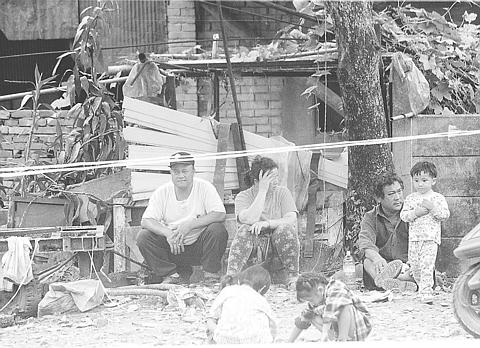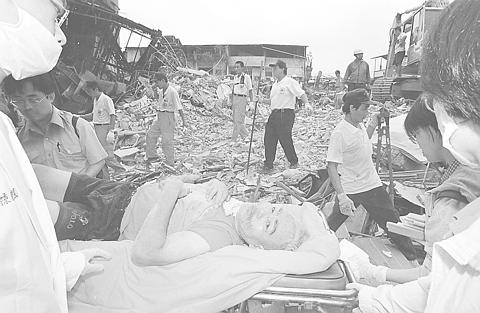As the dust settled in Puli from the worst earthquake in Taiwan this century, the town's many dispossessed residents are slowly coming to terms with the difficult future that awaits them.
Families camped outside their broken and destroyed homes have to deal with not only the fear, shock and trauma from the earthquake, but also the powerful aftershocks that continue to shake the ground around them.
Most have set up camps in open-air spaces, scattered throughout the town, in parks and in schools.

PHOTO: LIN CHENG-KUNG, LIBERTY TIMES
There is really no other place for them to go where they can feel safe, said Liao Yu-chen.
Liao was sitting in the playground of Puli's elementary school yesterday, surrounded by scores of other families facing a similar plight.
"When the quake hit, it felt like the end of the world," Liao said, describing her feelings on the night the earthquake destroyed the town.

PHOTO: CHANG YING-YING, TAIPEI TIMES
Luckily, she was able to get her family out of their home, which split nearly in two.
Now Liao, like many others, is stuck. She cannot return to her destroyed home, but is frightened to leave Puli.
"The roads are terrible -- I wouldn't go anywhere," she said. "Not only that, but aftershocks are a concern."
Just yesterday morning, Liao returned to her home to retrieve a gas cooker. But as she did, an aftershock hit again.
But yesterday, for thousands like Liao, there was a glimmer of hope. Rescue helicopters came and went several by the hour, bringing in food and water and taking away the injured.
Premier Vincent Siew (
They soon discovered that the damage in Puli is much more serious than the government initially estimated.
"It wasn't until 30 hours after the earthquake that we realized the extent of damage that had been sustained," said government spokesman Chen Chien-jen while visiting Puli.
"We were prepared, but in retrospect there was more that could have been done."
He said the government was now focusing on three immediate goals -- an urgent need to handle the bodies of those who lost their lives, shelter and tents for survivors who lost their homes, and for roads to be cleared of debris.
The government has also announced a relief budget of NT$3 billion -- as well as NT$1billion in immediate aid for Nantou, and another NT$1.5 billion for Taichung County.
Chen also said the government would be looking into the structural integrity of the affected buildings to find out why they had collapsed so easily.
Some buildings, he said, were not up to standards, pointing to the fact that many newer buildings had been destroyed.
"Those responsible should be investigated," he said.
At the Taichung veteran's hospital ambulances streamed in, bringing injured people lifted by helicopter from Puli.
A 32-year-old woman, her head wrapped in bandages, said she was in the town of Chongshi when the earthquake struck and the ceiling fell on her.
She was trapped for an hour before being rescued, but had to endure a 10-hour wait before she was taken to a hospital. She said her husband was suffering from exposure
The hospital, a mess on Tuesday as it struggled with the stream of patients, was operating normally yesterday but was packed with the injured.
In neighboring Yunlin County, US search and rescue workers combined their efforts with a local team in Touliu City, about 60km west of Puli, to save people trapped in two toppled buildings.
Workers had made contact with a 33-year old man, Hsu Tse-tai (許澤泰) a novelist, who was stuck beneath what remained of a 16-story building that had sunk five floors when it collapsed on Tuesday.
The workers were able to communicate with him, and had even fed him intravenously, as well as given him oxygen, into the small space within which he was trapped.
Last night his brother came down from Taipei to see if he was okay. There was rescue work going on the other side of the building, but his brother began to move through the rubble to where he thought the apartment would have been.
After some effort, he removed some debris, and started to call out his brother's name, and his brother called back (at 1pm yesterday), and have been trying to get him out ever since. His leg is pinned down by a slab of concrete. At press time last night, rescuers were chipping away at the slab and were confident of freeing him.
International rescue teams began arriving in Taichung yesterday.
Sccording to one member of the USAID team, the help that was being provided was, in his opinion, the best-organized that the group has encountered in its work abroad.
All three of the buildings that collapsed in Touliu were built by the same construction company, which declared bankruptcy over a year ago.
The other building had sunk deep into the ground, and the extremities of the 12-story apartment complex had split open, leaving a huge gaping hole in the middle, exposing metal rebar and concrete.
It was believed that at least four people were still trapped inside a complex that had housed 236 residents. Twenty survivors were pulled out, and another seven bodies were recovered.
But while rescue teams have managed to reach areas like Tou-liu and Puli, some areas remain cut off from the outside.
Aid has come too slowly, said Chung Lin-tong, a farmer who lives in Niomen outside of Puli.
Chung, along with his son came to Puli by motorbike to get milk powder for his newborn eight-month-old child. He and his family are living in their car outside of their country home which is no longer safe to live in. When the earthquake hit, Chung said, he had only one thought, "get my family and get out of the house."

Conflict with Taiwan could leave China with “massive economic disruption, catastrophic military losses, significant social unrest, and devastating sanctions,” a US think tank said in a report released on Monday. The German Marshall Fund released a report titled If China Attacks Taiwan: The Consequences for China of “Minor Conflict” and “Major War” Scenarios. The report details the “massive” economic, military, social and international costs to China in the event of a minor conflict or major war with Taiwan, estimating that the Chinese People’s Liberation Army (PLA) could sustain losses of more than half of its active-duty ground forces, including 100,000 troops. Understanding Chinese

The Ministry of Foreign Affairs (MOFA) yesterday said it is closely monitoring developments in Venezuela, and would continue to cooperate with democratic allies and work together for regional and global security, stability, and prosperity. The remarks came after the US on Saturday launched a series of airstrikes in Venezuela and kidnapped Venezuelan President Nicolas Maduro, who was later flown to New York along with his wife. The pair face US charges related to drug trafficking and alleged cooperation with gangs designated as terrorist organizations. Maduro has denied the allegations. The ministry said that it is closely monitoring the political and economic situation

‘SLICING METHOD’: In the event of a blockade, the China Coast Guard would intercept Taiwanese ships while its navy would seek to deter foreign intervention China’s military drills around Taiwan this week signaled potential strategies to cut the nation off from energy supplies and foreign military assistance, a US think tank report said. The Chinese People’s Liberation Army (PLA) conducted what it called “Justice Mission 2025” exercises from Monday to Tuesday in five maritime zones and airspace around Taiwan, calling them a warning to “Taiwanese independence” forces. In a report released on Wednesday, the Institute for the Study of War said the exercises effectively simulated blocking shipping routes to major port cities, including Kaohsiung, Keelung and Hualien. Taiwan would be highly vulnerable under such a blockade, because it

UNRELENTING: China attempted cyberattacks on Taiwan’s critical infrastructure 2.63 million times per day last year, up from 1.23 million in 2023, the NSB said China’s cyberarmy has long engaged in cyberattacks against Taiwan’s critical infrastructure, employing diverse and evolving tactics, the National Security Bureau (NSB) said yesterday, adding that cyberattacks on critical energy infrastructure last year increased 10-fold compared with the previous year. The NSB yesterday released a report titled Analysis on China’s Cyber Threats to Taiwan’s Critical Infrastructure in 2025, outlining the number of cyberattacks, major tactics and hacker groups. Taiwan’s national intelligence community identified a large number of cybersecurity incidents last year, the bureau said in a statement. China’s cyberarmy last year launched an average of 2.63 million intrusion attempts per day targeting Taiwan’s critical